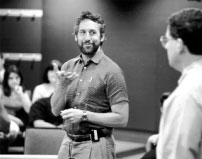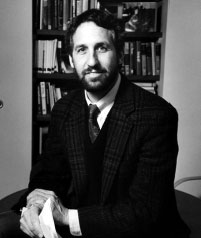Alumni Album
Arnold Epstein '74: A place at the policy table
By Laura Stephenson Carter
Arnold Epstein, M.D., is telling a story to a group of 60 physicians who have come to Harvard to learn about the business side of medicine. The story is about an ordinary woman who can't afford health insurance, even though she earns $31,000 a year working for a small business. And when she falls down, injures her hip, and is hospitalized for 17 days, she can't afford the medical charges either. In fact, for her, it's a financial catastrophe—her bill is $30,000. She's just one of the 43 million Americans with no health insurance, Epstein says, 40 percent of whom are employed part-time or in small businesses.
It's the first day of a 15-session class called "Current Issues in Health Policy" that Epstein, a 1974 graduate of DMS, teaches with a colleague. The course is part of an intensive master's degree program for doctors who want to learn management skills, study healthcare economics, and better understand healthcare policy. Epstein has a knack for teaching, using stories as the fabric into which he weaves dry facts and business concepts. He clearly enjoys interacting with the physician-students during the lively discussions that ensue.
The program was one that Epstein helped to create a year ago, and there aren't many like it in the country. "It still is one of only a handful," he says. "The medical marketplace has become much more competitive. We're seeing this again and again in all kinds of organizations—hospitals, HMOs, community health centers—that need physician-managers at the interface between traditional management and patient care.
"Historically," he continues, "most doctors have not been trained that way. What you've got is a doctor with very good interpersonal skills who gets co-opted into management, and does the job, but really is at sea as he or she gets to the upper levels. How do you equip them with the tools they need, and the insights they need, and the credentials they need, to move ahead?"
As a physician who is an expert in health policy, healthcare delivery systems, and quality management, Epstein is an ideal person to train fellow doctors about the medical marketplace. He was even a domestic policy advisor at the White House in the early 1990s.
Given that background, one might expect to see evidence of Epstein's many accomplishments in his bright, sunlit office—perhaps walls lined with framed diplomas, awards, and photographs of him shaking hands with national leaders. Indeed his office is filled with photos of the people he considers most important in his life—his family, including daughters Katie, Becca, and Elicia. And it's evident from the pictures and other items around the room—like a rubber chicken hanging upside down next to the door—that he likes to have fun. There's also a photo of him grinning while kayaking down a ferociouslooking river. He says he enjoys kayaking, as well as flying a Saratoga single-engine plane that he owns with a friend, because those activities force him to focus. But he says juggling multiple interests —which he does every day—is challenging and fun, too.
Yet Epstein takes his work seriously, too. "I've always been interested in social phenomena and behavioral science, and I've always had a visceral sense for problem-solving and people," he says. "So my job is a combination of working with people—either direct patient care or teaching—and doing consulting and research around social phenomena."
|
Epstein's expertise landed him a spot on President Clinton's transition team in 1992. |
His interest in public policy is rooted in his childhood in the Long Island town of Woodmere, N.Y. His father, an attorney who once ran for the New York State Assembly (though he lost), led dinner-table conversations on politics, social policy, and a variety of other thought-provoking issues. "The discourse around the house was more about . . . what's President Eisenhower doing," notes Epstein, than about mundane matters.
Epstein graduated from the University of Rochester in 1969 with a B.A. in mathematics and political science, having spent a year at the London School of Economics, and he went on to earn an M.A. in political science from Harvard in 1972. But he yearned for something more.
He was "working on the boundaries between political science, mathematics, and economics," he explains. But "what I was doing was . . . pretty theoretical, and it was really too dry. I stopped enjoying it while I was in graduate school. It became apparent to me that I didn't want to do that, but I wasn't a hundred percent sure what I did want to do."
The medical profession intrigued him, though. He got a glimpse of academic medicine—his sister's husband was a physician at the University of Chicago—and what he saw excited him. Epstein adds, "I think the [Vietnam] war had something to do with it [too]. . . . I wanted to make sure something I did was constructive and not destructive."

|
|
Both classrooms (above) and boardrooms (facing page) are familiar milieus for policy maven Arnold Epstein. |
So off he went to Dartmouth Medical School, which at the time still had a two-year preclinical program. "Med school was, in some ways, easier than I expected," Epstein says. "They told you what to do every day and you did it." For him, graduate school had seemed to be a place where "people have always been trying to think great thoughts," and his undergraduate education had taught him "to analyze things and think through problems." But in medical school, "I had to learn how to memorize. It's just a skill I hadn't been taught so clearly."
After completing his M.D. at Duke, Epstein spent the next two years at Harvard doing his internship and residency at Peter Bent Brigham Hospital. Until then he had been so consumed by learning medicine, that he had had little time to think about anything else. But as he emerged from the intensity of medical school, he felt himself becoming restless. "It was only after internship when I started to rethink again," he says.
In 1978, he returned to England, this time as a visiting research fellow in social and community medicine at Oxford. "I basically took the year to learn some research skills and think about what was going on in the research world between epidemiology and health services and clinical medicine, and to figure out what interested me," Epstein says. He discovered that he was "most interested in transporting notions of behavioral science, social science, political science, economics, into the clinical milieu."
Back at Harvard, he had an opportunity to do just that, as he began building a career as an academic physician and an expert in health-care policy and quality. Today, he is a professor of medicine and of health-care policy at Harvard Medical School, and a professor and the chair of health policy and management at the Harvard School of Public Health. His research interests center on determining how financial incentives, different payment systems, and organizational changes affect health-care access and outcomes and how patients' socioeconomic status affects the quality of care they receive.
His expertise landed him a spot on President Clinton's transition team in 1992, and, for the next two years he worked in the White House as a domestic policy advisor for health care. Since then, he has continued to play a national role as an advisor and consultant on health-policy issues. He sits on a number of national boards and has served as a consultant to many organizations, to state governments, and to other countries, including Germany and Colombia. He is the incoming chair of the Academy for Health Services Research and Health Policy, the vice chair of the Institute of Medicine's Committee on the National Quality Report on Health-Care Delivery, and a member of several committees of the Joint Commission on Accreditation of Healthcare Organizations.
In addition, he has published more than 125 articles, chapters, and books on health-policy topics and is in demand as a speaker at national and regional conferences.
Everybody knows that the marketplace has become a good deal more competitive," says Epstein. But he doesn't foresee major upheaval, predicting instead that "we're going to continue to round out a series of incremental changes led by state government, federal government, and private market [forces], trying to keep this market-oriented medicine intact, and continue to incrementally reduce the number of uninsured and underinsured.

|
"I think we're going to see attempts to shore up Medicare, get drug coverage for the elderly, [and] expand coverage for the uninsured." However, he says, "I don't think we're likely to see sweeping public approaches—not universal coverage —in the near future."
He believes the Internet is "never going to replace what has been traditional medicine, but it will complement it." Patients and doctors will be be able to communicate more easily via e-mail and Internet chat rooms, he says, and doctors will be translators of Internet-based health information. He expects the Internet may also provide greater efficiencies in scheduling appointments and gathering research data.
As for academic medical centers, Epstein sees them "becom[ing] more efficient in how they deliver care," and he projects that "the government and foundations will pick up [costs] on the research side."
Epstein clearly enjoys his work. "It's a great mix," he says. "I get to do things locally—to get involved with people, problem-solving, ideas. I get to be involved in program development. I get involved helping junior people develop professionally. I get involved building the infrastructure. I get involved on a set of issues that are not only interesting to me [and] pose interesting questions, but they turn out to be important. They're real issues that affect people's lives.
"At the end of the day," he says, "if I feel like I've had a good day at work, I feel like maybe the world can be a better place for it. That's not a bad thing to have for your job."
Laura Carter is the associate editor of Dartmouth Medicine magazine.
Photographs by Richard A. Chase
Back to Fall 2000 Dartmouth Medicine
